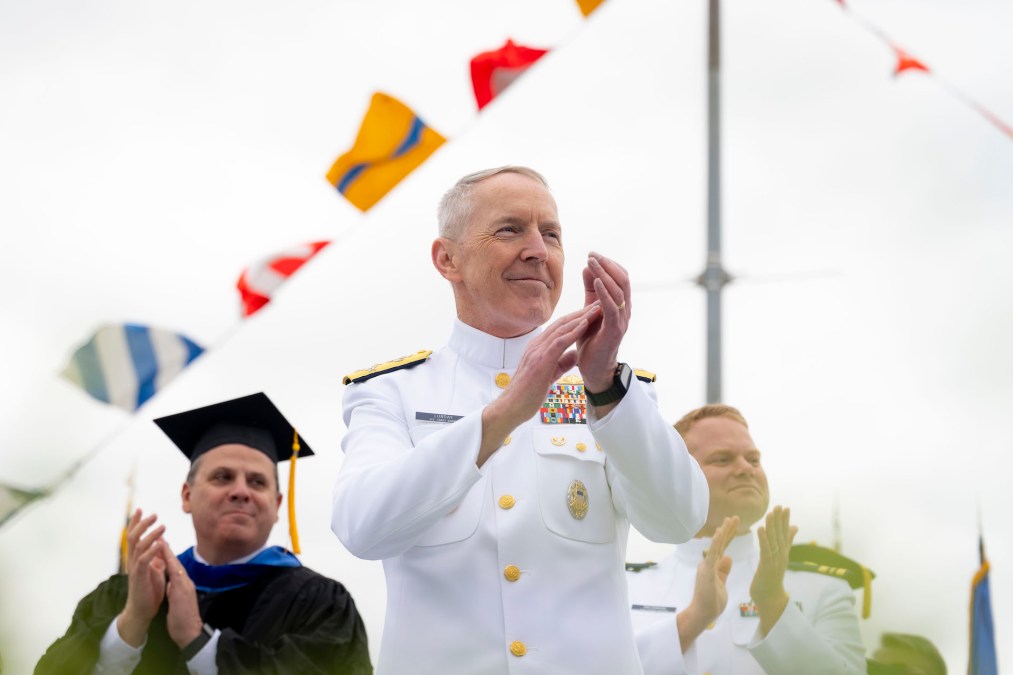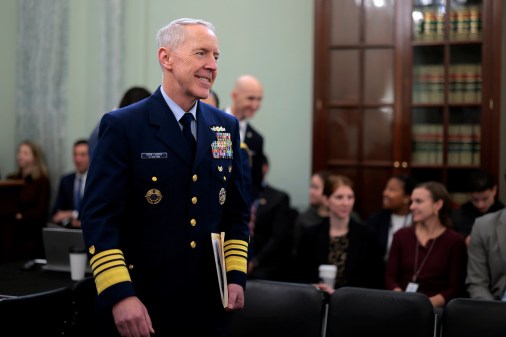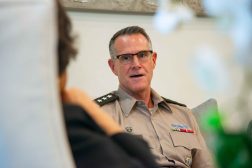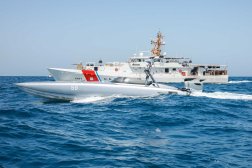Trump nominates cyber expert for Coast Guard commandant

President Donald Trump has formally submitted the nomination of Adm. Kevin Lunday for Coast Guard commandant.
The nomination was sent to the Senate on Oct. 23 and referred to the Committee on Commerce, Science, and Transportation for consideration, according to a notice posted on Congress.gov and a congressional source.
Lunday has been serving as acting commandant since January, in the wake of the firing of Adm. Linda Fagan shortly after Trump took office for his second term. Prior to that, Lunday was vice commandant.
His selection for the top job didn’t come as a surprise. Secretary of Homeland Security Kristi Noem indicated in May that the president would nominate him, but the move hadn’t officially been made until recent days.
Although the Coast Guard falls under the Department of Homeland Security, it is considered a U.S. military service and part of the joint force. For example, its personnel and platforms often work with the Navy on maritime missions.
Lunday is a graduate of the U.S. Coast Guard Academy, the National War College, the Naval War College, and George Washington University Law School, according to his official bio.
Notably, he has worked closely with the Defense Department’s cyber community.
“Experienced in operational and technical cyberspace operations, Admiral Lunday served as Commander, U.S. Coast Guard Cyber Command where he directed the operation, maneuver, and defense of the Coast Guard Enterprise Mission Platform as part of Department of Defense (DoD) networks. He also directed remote and deployable cyberspace operations to protect U.S. maritime critical infrastructure from cyberattack. Prior to this role he served as Director of Exercises and Training (J7), U.S. Cyber Command where he directed the joint training and certification of the DoD Cyber Mission Force, the nation’s cyberspace warriors,” his Coast Guard bio states.
Lunday’s nomination comes as the service is pursuing a new modernization plan dubbed Force Design 2028, which was unveiled earlier this year and includes major upgrades to the organization’s digital capabilities.
“Now after decades of underinvestment and severe readiness challenges, the President and Secretary of Homeland Security have directed action to renew the Coast Guard to become a more agile, capable, and responsive fighting force,” Lunday wrote in the introduction to the Force Design 2028 execution plan that was released in July.
“This comes at the same time as the largest capital investment by the American people in the Coast Guard in our history,” he added, noting that recent legislation included more than $24.5 billion to recapitalize aircraft, cutters, boats, shore infrastructure, and command, control, communication, computer, cyber and intelligence (C5I) technology.
The program executive office for robotics and autonomous systems is also contributing to the modernization drive as the service pursues those types of capabilities to enhance maritime surveillance.
In a report released earlier this year, the Government Accountability Office said additional efforts were needed to address cybersecurity risks to maritime transportation systems.
Coast Guard Cmdr. Joel Coito, a military fellow at the Center for Strategic and International Studies, noted in a commentary published on Oct. 23 that there’s reason for optimism.
“With nearly $25 billion of funding in the One Big Beautiful Bill Act, the USCG finds itself in the favorable—if unfamiliar—position of having resource winds at its back. The result? A chance for generational change in safeguarding the maritime cyber domain and bolstering the USCG cyber workforce,” he wrote.
“DHS Secretary Kristi Noem approved the FD 2028 execution plan, making a host of changes to the USCG’s organization, contracting, acquisitions, personnel, and technology. Most relevant to cybersecurity, the execution plan modernizes legacy USCG cyber systems, enhances its cybersecurity posture (including implementation of the Department of Defense zero trust architecture), establishes a program executive office for Command, Control, Communication, Computer, Cyber, and Intelligence, and equips the USCG Cyber Command with new tools to defend the USCG network and combat cyber threats,” he added.
He noted the cyber expertise of Lunday and other service leaders, writing that they’re
“uniquely qualified to drive USCG cybersecurity changes.”
“To capitalize on this expertise, USCG leaders should be confirmed,” Coito wrote, adding that Senate-confirmed leaders are best positioned to confront the digital threats the nation is facing, including in the maritime domain.
It’s unclear when Lunday’s confirmation hearing will be held.






